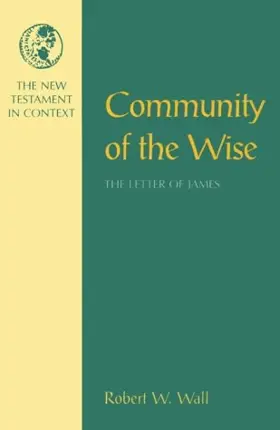

Community of the Wise: The Letter of James
Pages
354 pages
Publisher
Trinity Press International
Published
8/1/1997
ISBN-13
9781563381430
Collections
This book appears in the following featured collections.
- The Pastor’s Bookshelf by Scot McKnight
Reviews
All scholars know that one of the finer commentaries on James is by Rob Wall
[Full Review]
Valley Forge, PA: Trinity Press International, 1997. Pp. xii + 354, Paperback, $24.00, ISBN 1563381435. Patrick J. Hartin Gonzaga University Spokane, WA 99258 This commentary brings a freshness to the reading and interpretation of James. In the introduction (pp. 1-38), Wall sets forth very clearly his distinctive approach which he defines as “canonical,” that is “interested in reading the whole of scripture as the church’s authoritative (or 'canonical') witness to God and so formative and normative of the church’s understanding of God” (p. 23). By this, Wall does not intend to adopt yet another new interpretative methodology. Rather, his intention is to select among the existing exegetical methods those that are suitable to foster a theological reflection that is at the service of the Christian faith today. According to this approach, the letter of James is to be read in its canonical context as one writing among many others bearing witness to the Christian faith. If James is taken seriously as part of canonical scripture, then the aim is not to try to reconstruct the meaning James had for the first audience and readers, but rather its meaning for present-day readers. This context gives meaning to Wall’s whole interpretative strategy. He carries through this approach consistently and it influences his understanding of all the basic questions that arise. For example, as regards authorship, Wall rescinds from entering into the historical issues related to this question and prefers to interpret the reference to James, as author, in a theological sense. This claim to authorship locates the writing within “a particular revelation tradition” (p. 40) and situates it within the Jewish-Christian theological tradition of early Christianity that traces its origins back to James, who bore witness to a faith in God that was witnessed through the teachings of Jesus.
[Full Review]

